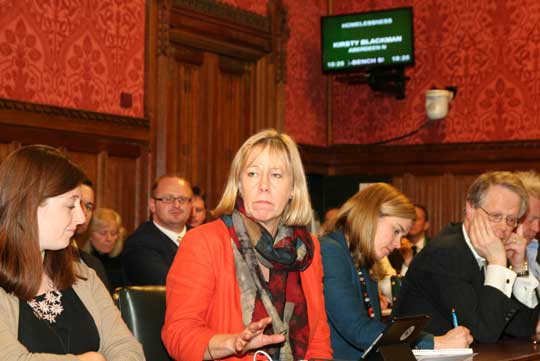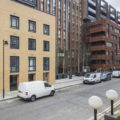
A bleak picture of shared ownership tenure, promoted by government and housing associations as the first steps to home ownership, was laid before MPs earlier this month.
Solicitor Giles Peaker, of Anthony Gold, who specialises in representing tenants and leasehold owners, was addressing the All Party Parliamentary Group on leasehold and commonhold reform.
Many present, such as Ruth Cadbury, Labour MP for Brentford and Isleworth, have direct experience of the unfairness that can be encountered by housing association shared ownership leaseholders.
The aim of shared ownership was to help lower paid and essential workers to get a foot on the housing ladder given exorbitant property prices, particularly in London.
“As you will see when you start looking at the legal structure, that is not entirely how it works,” said Mr Peaker.
“The name shared ownership is probably about as wrong as it possibly could be in crucial respects: its costs are not shared and in very definite effects it is not ownership.”
Mr Peaker explained: “What a shared ownership leaseholder actually has is an assured tenancy, for a fixed term of 99 years or 125 years.”
Mr Peaker said that this interpretation was confirmed in the 2008 case in the High Court of Richardson v Midland Heart housing association. Referenced in the New Law Law Journal here https://www.newlawjournal.co.uk/content/shared-ownership-leases
“What that means is that unlike an ordinary lease is that all the issues and grounds around forfeiture don’t apply. It is an assured tenancy for the purposes of the Housing Act 1988.
“But … that also excludes relief from forfeiture.”
The possession process follows the Housing Act 1988.
“Possibly the most dangerous one for shared ownership tenants is what is called ground 8. It is a mandatory ground which says that if you are in two months’ rent arrears at the time a notice is served, and then in months’ rent arrears arrears at the time of a court hearing on a possession claim, the court MUST make a possession order. It is a mandatory ground and there is no way round it.
“Unless you have a mortgage lender who is prepared to step in, you lose the whole shared ownership lease. You also lose the premium you paid for it.
“It is possible on a £1 million shared ownership flat in London, where you might have a 25% share, that you could lose it all on two months’ rent arrears.”
There will be no possibility of retrieving the situation by seeking relief of forfeiture under the lease, which usually gives you six months after a possession order.
Mr Peaker said:
“What this means in effect is that your security of tenure on a shared ownership lease is considerably less than a standard long lease.
“We know that you can lose everything because that is exactly what happened in Richardson and Midland Heart.
“It involved a 25% share and no mortgage. That had been paid off. A couple of months’ rent arrears and the housing association said: ‘Don’t worry, we will help you sell.’ And then immediately served a section 8 notice and immediately brought possession proceedings.
“The whole property went.
“That was it.
“Midland Heart did say that as a gesture of goodwill it would repay the premium. It is very unclear whether they actually did. Last I heard from Mr Richard’s lawyers was that they hadn’t.
“So, that’s the ownership side. You have got an assured tenancy. It is a long term one, with significantly less security of tenure.”

Having highlighted concerns with the “ownership” aspect of shared ownership, Mr Peaker then turned to the “shared” side of things.
“Your share – 25%, 75% – you don’t actually hold. It is not an interest in the property; it is a contractual right to a percentage of the equity of the property when it is actually sold. It is just a contractual right to a share of the sales price.
“You are paying a premium in effect for the right to staircase to 100%. It is unbelievably hard to get figures of the tenants who actually do staircase to 100%. The only people who hold them are the housing associations. The usual figures that circulate are between 5% and 8%.
“Now as a route into property ownership, where between 5% and 8% finally get to 100% ownership of the property, that is starting to sound as though there are problems with the model.”
For those lucky few who do staircase to 100% share of the property, there can also be problems: one of the shared owners present at the APPG did precisely this … and then found she had to find another £30,000 because the lease had gone below 80 years. This prompts the question of why they are sold with relatively short long leases – 99 or 125 years – instead of 999 years.
The crucial area where shared ownership is not shared is service charges.
Mr Peaker said:
“Usually, if you are paying rent on a short tenancy the rent covers repairs. The landlord is liable for the repairs: you pay the rent, but you do not pay anything on top.
“Or, if it is a conventional long lease you pay a full service charge.
“But here we have got a model where you are paying significant rent and 100% service charges.
“In terms of your paying for maintenance costs you are, somewhere along the line, effectively being double charged.
“If you only have a 25% share, you are paying 75% rent equivalent and the full service charge.”
The rent aspect of shared ownership is usually spelled out in the lease. “They vary but I have seen examples with annual rent increases of inflation plus one per cent or 5%, whichever is the higher,” said Mr Peaker.
“So you have actually got a 99 year or 125 year assured short term tenancy with a built-in 5% rent increase.
“But private rents have not been going up at 5%.
“Over time that is going to be a significant increase, particularly where these are being sold as ‘affordable’ ways into ownership.”
There are notable restrictions on sale as well, as housing associations can usually veto potential buyers if they do not meet their requirements for a shared ownership purchaser.
“So unless the perfect person comes along and the housing association likes them you are stuck on selling.
“And despite the fact that the housing association will be recovering 75% of their stake of the equity on sale, you pay all the sale costs.”
Mr Peaker was not impressed with government proposals to allow share ownership leaseholders to buy small increments in their share, as low as 1%.
“If you do want to purchase a further share the cost is based on the market value of the property when you want to purchase it. So if the property has significantly increased in value from the time you originally purchased it your second 25% will be a lot more than your first 25%.
“You have to pay for the valuation, which the housing association will have carried out, and you have to pay the housing association’s fees each time.
“Quite how this works with the government proposals to allowed shared owners to increase their shares 1% at a time – with all the fees each time – I have no idea.
“I don’t think that allowing people to increase shares by 1% or 5% will either encourage people to staircase to 100% much more, or is really the issue on affordability. But there we are.”
Mr Peaker concluded by saying that it was his experience that a lot of shared ownership properties were “really badly built”.
“There are particular repair issues that impact on shared owners. These concern section 106 developments.
“These are private developments where a housing association has then itself leased some of those flats which it will then sell on as sub-leases for shared ownership.
“The problem with those is: who is responsible for maintaining and repairing the building. Usually it will not be the housing association.
“So, there may be some third party management or freeholder in place who is actually responsible for carrying out the repairs.
“The question is what happens when things go wrong or the repairs are not done? What can the shared ownership tenant do about it?
“And the answer is usually: nothing. Because they have no privity of contract with the freeholder. There will be nothing in the lease from the housing association that will make it responsible for the repairs.
“There will usually be a best endeavours clause: we will try and get the freeholder to carry out repairs if you tell us about them.
“How do you enforce that?”
Mr Peaker added:
“The shared ownership tenants are wholly reliant on the housing association taking problems up with the freeholder and seeing it through.
“I have been doing this for a number of years and the amount of times I have seen housing associations taking legal action against the freeholders to carry out repairs is about nil. It does not happen. Negotiations. Arguments. Discussions. Meanwhile the roof is leaking and the windows are falling out.
“This is not something that people are aware of in advance.”
Mr Peaker concluded: “As a lawyer who usually acts for tenants and leaseholders I can safely say that one thing that people never, ever do when buying a property is to check the repairing provisions in their lease.
“Nobody ever does. Except me. But that’s my job. So, these problems only come to light later on.
“These are the problems and they highlight the misnomer – the complete misnomer – of the actual product of shared ownership.”
There was a Green Paper in August 2018 on shared ownership, and a White Paper is supposed to be in the offing at some point.
Mr Peaker’s analysis of shared ownership was echoed by the experience of several MPs present.
Ruth Cadbury had an example in her west London constituency: “Shared owners raised issues of repairs to their building with the housing association, who some years later said: ‘Oh, we should have taken action against the builder but now we are out of time [six years having past].’
“Meanwhile, the fully private block next door the residents had got their act together and taken the developer to court and had the scaffolding up.
“Housing associations have never been on top of oversight of the block that they are about to take over from the developer.
“They are not on top of head leases, repairs or estate management. They just do not seem to have competency in all these core areas where they should do.”





 Coronavirus lockdown should not stop work on cladding, government told
Coronavirus lockdown should not stop work on cladding, government told





















Great article government need to look into shared ownership as its a money pit for housing Associations and leave leaseholders in a position where there investments become in-affordable because of huge service charge bills and 5% rent increase every year. The properties are difficult to sell as HA have strict processes that are based in there favor and not those who make ill formed decisions to invest in them on the basis of miss-selling practices from HA and because the buyers are no knowledgeable on what they are truly getting for their investment.